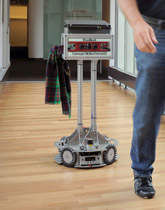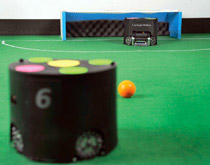
Manuela Veloso has intriguing professorship offers from several prestigious universities. One of them is from Carnegie Mellon University, where she just earned her PhD from the School of Computer Science. As she contemplates the pros and cons of the respective opportunities, her telephone rings.
The caller is Allen Newell (TPR'57), the Carnegie Mellon professor who in 1975 was awarded the A.M. Turing Award, along with his colleague Herbert Simon, for contributions to artificial intelligence and the psychology of human cognition. The Turing Award is often called the Nobel Prize of computing, so Veloso doesn't take Newell's opinion lightly. He has a simple message for her: stay at Carnegie Mellon.
His call is followed by another, from Simon, who, in addition to the Turing Award, won the Nobel Prize in Economic Sciences in 1978. He has the same message for her. As do others from the Carnegie Mellon faculty.
The calls sway Veloso, who also earned her master's degree at Carnegie Mellon prior to her PhD. She finds it mind boggling that Newell and Simon-who developed the first true AI program and basically pioneered computer science-want her to become a peer. Newell's call especially touches her. Veloso knew he was in ill health, but he was full of enthusiasm about the possibility of her staying at Carnegie Mellon. "I stayed at CMU because of that phone call," she says.
Newell passed away in July 1992, a few months after Veloso accepted the position. But his mentoring has stayed with her nearly two decades later. She says that many of the lessons she teaches her students are from lectures taught to her by Newell and Simon. "Herb would always give a 'What is research?' speech every September to first-year graduate students," she explains, saying that she made a point to never miss the lecture. "He would say that you need to have a secret weapon in research, something that you do better than anyone else."
At the outset of her academic career, she decided her secret weapon would be AI in robotics. Veloso's research led her and her students to come up with the concept of a robot soccer team. Why? Well, soccer features a constantly changing environment in which the outcome of every action is uncertain; it forces robots to cooperate with one another. Such technology has real-world applications-from crowd management at concert venues to traffic regulation. "I don't see robots as only having great motors, cameras, or devices for manipulating," she says. "I envisioned robots being intelligent creatures with the ability to process sensory data, plan, reason, learn, and act in the environment."

For her first two years, she and her students worked to construct small robots. None worked. But she says she wasn't worried. "I'm not a giving-up kind of person," she says. By 1996, her lab created a soccer robot team that understood teamwork. That year, she shared her success at an AI conference in Tokyo. While eating lunch with robot soccer enthusiasts, mostly professors from around the world, the idea of RoboCup was born. Fourteen years later, it's an international award-winning federation that hosts robot soccer tournaments, and she is the president: "We never thought RoboCup would grow to a 3,000-person event like it was this past year in Singapore. We never thought there would be RoboCup Junior [geared toward younger students through age 19]." The CMU RoboCup team she advises, the CMDragons, has won four championships ('97, '98, '06, '07) and, most recently, placed second in Singapore.
Clearly, Veloso's "secret weapon" career has thrived. She became a full professor in 2002 and says she was honored to be named the Herbert A. Simon Professor of Computer Science in 2006. Simon was impressed with Veloso's early accomplishments as evidenced by his encouraging comments about robot soccer in a lecture he gave in 1999. "He said he has been amazed, intrigued, and floored by the research," she says proudly. "When he passed away [in 2001], I felt, and still feel, quite lost," she says.
Veloso also directs the CORAL research laboratory, for the study of agents that Collaborate, Observe the world, Reason, Act, and Learn. She is the recipient of several awards and honors, and she has published more than 200 journal articles and conference papers, as well as a book, Planning and Learning by Analogical Reasoning. Throughout her years at the university, as a student and a professor, she says she has never looked back at her decision to stay here. In fact, she has been an active alumna throughout the years.
She currently is working with students on her newest secret weapon: CoBots, or companion robots, which move autonomously within an environment. They are basically laptops with cameras on omni-directional wheels. If they're sent to get coffee, they will, at some point, need the help of a human, whether to open a door, press the button for the elevator, or pour the coffee into the cup. They will communicate with people by asking questions such as: "Would you be able to pour a cup of coffee for me?" or-if no humans are available-will send an email alerting someone that it's "stuck" and needs assistance. Veloso says that the novelty of CoBots is that they actually know what they can and cannot do.
Veloso's plan is to have multiple CoBots moving throughout the Gates and Hillman centers and Newell Simon Hall within the year, where they will run errands for students and professors, ranging from retrieving mail to relaying messages. Although robots certainly are not new to CMU-and several have made significant contributions to science-they were never completely on their own.
"It's science fiction coming to life," she says. "My secret weapon, as Herb Simon used to say."
For video of Carnegie Mellon's RoboCup team in action, visit: www.cs.cmu.edu/~coral/main/ and then click the Multimedia link.
Laurel Furlow, a former newspaper reporter, is the assistant director of on-campus programs in the Office of Alumni Relations.



